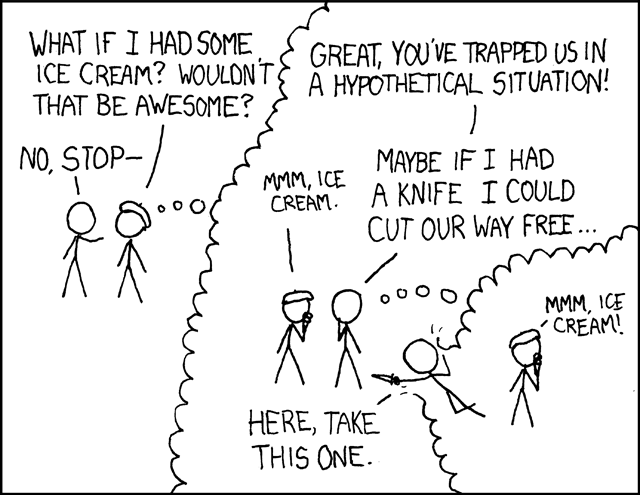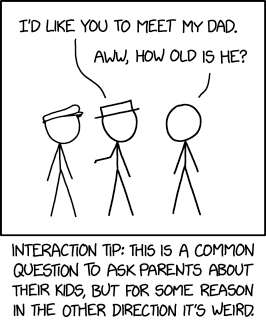Thought Experiments and Hypotheticals
It is the mark of an educated mind to be able to entertain a thought without accepting it
~ Aristotle[1], circa 350 BCE.
I like to conduct thought experiments because they are useful to understand how people think. But, almost always, I am disappointed because people get defensive and refuse to engage.
Perfectly understandable and often frustrating, but it does not faze me, I'll keep trying.
One way to conduct a thought experiment is to use a hypothetical situation. A key requirement for such is that the participant provisionally accepts the premise(s) and then reasons out the rest.
Albert Einstein used thought experiments a lot. They were useful to him to explain complex phenomena and to gain insight into them. His book, Relativity, is filled with such. As an example, they shed light on how the same object falling from a moving train appears to take a different path depending on whether the observer is watching from the stationary platform, or from the train itself.
Such experiments are much easier to pose when the subject matter is impersonal. But pose it anywhere near the domain of ethics, and the evasion begins.
I mention this because I want to set the stage for a future discussion on Torture. I suspect the subject makes one cringe, and to be fair, it is a bit cringeworthy. However, it is hard to invite people's thoughts on it without a proposition for people to challenge. Twice, I have tried, and each time the audience has exited Stage Left in haste or made definitive conclusions on my ethics. That would not be so bad, except I got little from it.
So, I am going to set the stage with simple examples for people to get a feel for how hypotheticals work. And how easily some hypotheticals can be shut off.
Consider, for example, you are driving home late after a long day. You are about five minutes from home, and you run out of gas. If I ask which of the following would you prefer (and why?) it may reveal some aspect of your personality:
- Call your best friend, knowing she'd be asleep. and inconvenienced.
- Call a towing service, and wait, even though it won't arrive for another 120 minutes.
- Walk home; it'll take you about 45 minutes, and you can get your car the next day.
Pretty benign, right? The hypothetical does not entertain other options (such as, wave down a passing car and siphon some gas, or have them get you gas), not because such is inconceivable, but because it is irrelevant to the thought experiment being conducted.
Still, most people would not have much difficulty picking one of those three. The choice may not be optimal, but, it is pretty benign to "play the game."
But what if you pose the question, and one of the responses is
- My car never runs out of gas, I make sure of it!
or
- My car is an electric vehicle, never needs any gas.
Kinda kills the purpose, does it not? After all, is it really that hard to assume the premise that you could be in a vehicle that ran out of gas?
I gripe about receiving these types of responses because it is something I encounter frequently, especially on forums related to religion or atheism, and a thought experiment is simply destroyed. "Trap, trap, trap!" is the subliminal message I heard back from the audience (followed by subliminal epithets).
The resistance is even stronger when I attempt a proof by contradiction. To elaborate, there is a simple mathematical theorem that states "there is no greatest prime number," or alternatively, "the set of prime numbers is infinite." Most of us would take that for granted, but how would one prove it? Well, as it turns out, one way is to use to proof by contradiction. In this case, the skeletal proof resembles:
The resistance is even stronger when I attempt a proof by contradiction. To elaborate, there is a simple mathematical theorem that states "there is no greatest prime number," or alternatively, "the set of prime numbers is infinite." Most of us would take that for granted, but how would one prove it? Well, as it turns out, one way is to use to proof by contradiction. In this case, the skeletal proof resembles:
- Assume that there is a largest prime number (a premise that contradicts the theorem).
- Let that number be n
- Show that there is a number m, which greater than n, one that is not divisible by any number less than or equal to m (except 1).
- If we show that such a number (m) exists, then we would have contradicted 1. So, by contradiction, we would have proven that there is no largest prime number.
The salient point here is that Step 1 is asking you to provisionally make an assumption. Unless you can do that, you cannot proceed in any constructive manner. It is a key aspect of hypotheticals.
Of course, this can get uncomfortable where other hypotheticals are presented: "You are in a boat with your mother and your sister. The boat springs a leak and you can save only one, neither your sister nor your mother can save anyone else. Which do you save and why?"
Now, if you answer "sister," or "mother," or "sister, because my mother has lived a long enough life," a conversation can proceed. But if you answer with "I'll save both," or "we'll plug the hole and try to save all three," "we'll all be fine SK, we are excellent swimmers," you are not even trying. This is not a test to see if you are a horrible person or a swimmer, but what you do when there are only bad options.
So, what do you folks think of hypotheticals or thought experiments? Do you use them yourselves, avoid them like the plague, find them irritating, or something else entirely? I do know that some of you have been put into tight spots by yours truly on occasion, so this would be a good time to express your reservations and thoughts on the matter.
I'll leave you with that final hypothetical of the leaky boat. But I do not want you to answer it. I just want to hear from you whether you have difficulty answering it, and why. No pressure.
I'll leave you with that final hypothetical of the leaky boat. But I do not want you to answer it. I just want to hear from you whether you have difficulty answering it, and why. No pressure.
__
[1] More or less


Comments
Post a Comment